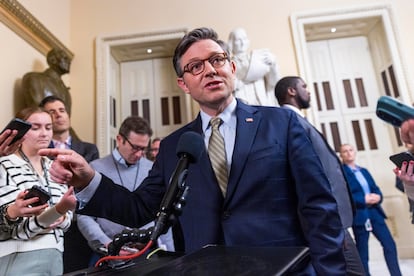US government shutdown crisis tests Musk’s influence and Trump’s struggle to push through his agenda
The agonizing 11th-hour negotiations on a spending deal forecast a troubled relationship between Congress and the president-elect, who needs lawmakers’ support to fulfill his promises on mass deportation and tax cuts

The nerves on display, the backstabbing, the usual representatives seeking the spotlight, the reporters running through the narrow halls, the last-minute commitments and the more or less happy ending… Almost nothing that happened in the Capitol on Friday, a frantic day that ended with the approval of a temporary spending measure to avoid a government shutdown, was a surprise for the veteran spectators of the great theatre of Washington. And yet the negotiations between both parties to avoid the spending tap being cut off at midnight ― which would have left some 875,000 federal workers without their Christmas pay ― offered valuable clues about the difficulties that await Donald Trump and his government of billionaires to push through their agenda in a hurry with a Congress that Republicans control only by a narrow margin.
It also served as a dress rehearsal for the enormous political influence that Elon Musk, the richest man on the planet, is likely to have for at least the next four years, provided he retains the position of Trump’s First Buddy. Using nothing more than his expensive toy, the social network X, which he bought in 2022 for $44 billion, the tech tycoon was able to knock down a bipartisan agreement that had been negotiated for months. He did so with online posts, about 150 of them, and threats like this one: “Any member of the House or Senate who votes for this outrageous spending bill deserves to be voted out in 2 years!”

Not only did he cause a legislative nightmare before Christmas and ruin the quiet week that Democrats and Republicans had been counting on, expecting to go home on Thursday as usual; Musk also inaugurated an era in the not-so-new relationship between oligarchy and political power in a country where wealth is usually virtuous in principle. With evident haste to begin governing ― the cliché would say from the shadows, if it were not for the fact that he does everything in full view of his more than 200 million followers ― Musk pushed the third authority in the country, House Speaker Mike Johnson, to the edge of the abyss and managed to make even Trump dance to his tune.
The president-elect has entrusted the tycoon with the joint leadership of the Department of Government Efficiency. In what could be seen as the first item on the agenda of a job that in theory does not begin until the inauguration on January 20, Musk apparently decided that the bipartisan spending deal was another wasteful expression of what is wrong in Washington, so he forced a review… and then another. And all this, while the billionaire showed his support for the far-right party Alternative for Germany (AfD) in the next elections in that country, and raised questions about whether the success of his investment of more than $260 million in the campaign that brought Trump to the White House will not in fact be the first step in a plan for world domination (and right-wingization).
The watered-down spending text was ultimately supported by 366 of the 435 representatives, and received 34 votes against, all from Republicans. Late on Friday it was approved by the Senate and signed by President Joe Biden on Saturday. It includes, in addition to the guarantee of government funding until March 14 (the day on which a new installment of this recurring drama in Washington is expected to unfurl), the updating of a law to fight poverty and encourage agriculture and a budget of $110 billion in subsidies to farmers and aid to victims of natural disasters.
Along the way, measures to reduce the cost of medicines, money to promote medical research and limits on investments in China were left out. Also, in what was a disappointment for Trump, his express request to take advantage of the opportunity to raise or suspend the debt ceiling had to be sacrificed. In an earlier vote, the unthinkable had happened: 38 Republican representatives, apparently more fanatical about cutting public spending than he was, voted against a deal supported by the president-elect, who may have the GOP at his feet, but is facing an ideologically divided party when the issue is public spending.
Money to fulfill promises
In a desire that may seem paradoxical for someone who campaigned on a promise to slim down government, the president-elect wants to end the spending limit by any means necessary. He needs it to carry out two of his main promises: the mass deportation of illegal immigrants and tax cuts. Extending that ceiling until 2027 is a debate that falls to the new Congress, which will be formed on January 3, but, as with everything else, Trump ―who has been in practice holding power for weeks, with Biden half gone― was in a hurry. The moment he takes office, he will do so with an expiration date; the law, unless he changes it, does not allow him to run again in 2028.

The events that transpired last week also indicate once again that there is an unbridgeable discrepancy between the elastic way in which the president-elect interprets reality and reality itself. He clearly won at the polls, in the electoral vote and in the seven decisive states, but it was not the overwhelming victory that he proclaimed on election night, long before the end of the vote count. And it was not, above all, an all-out victory in the House of Representatives, where the Republicans have gone from having 222 seats to 220 (compared to 215 for the Democrats).
Trump said in an interview with Time, in the magazine issue that crowned him “Person of the Year” for the second time, that he believes he has received “a huge mandate” from the American people. Republicans control both chambers, albeit with small margins, and in a country that, as seen again in recent days, knows nothing about party discipline, he is not guaranteed smooth governability.
Trump’s first big test, which is above all a test of Johnson’s leadership, is just around the corner. On January 3, the House will vote to elect its speaker, and the ultra-conservative congressman from Louisiana needs all the votes he can get. Thomas Massie, a libertarian from Kentucky, has already told Johnson not to count on his support. Two years ago, it took 15 rounds of voting and a good handful of concessions to the hardline wing of Trumpism to elect his predecessor, Kevin McCarthy. After going through such humiliation, McCarthy only lasted 10 months in the post, from which he was ousted by a no-confidence vote.
On Friday night, Johnson appeared before Capitol Hill reporters after saving face, unable to contain a chuckle of relief. He was proud of having passed “America First” legislation and, in further evidence of how quickly the extraordinary is normalized in Trump’s America, unabashedly acknowledged that less than an hour earlier he had spoken to Musk about the challenges of his job. “We talked about the extraordinary challenges of this job. I said, ‘Hey, you wanna be Speaker of the House? I don’t know.’ He said this may be the hardest job in the world. I think it is.”
Chaos and legislative paralysis have defined Johnson’s time leading the House Republicans. It’s hard to believe that the return of Trump, an unpredictable politician who instigated an insurrection, will change that, coupled with the disruptive element posed by Musk, who recently showed up to meet with conservative senators with his four-year-old son on his shoulders. In the spectacle society of American politics, Capitol Hill has been populated in recent years by quirky figures whose egos are fueled by social media and their presence in the endless news cycle of cable television networks. Many of them are Republicans, and many came to Washington with the mission of containing public debt, which has skyrocketed in the last decade, especially since the pandemic. Such personalities do not guarantee a smooth term, even if this time the president will be enjoying much greater support, at the polls and within his own party, than he had in 2016.
The disputes with Congress were constant during his first term in the White House. The most notorious one led to the longest government shutdown in history in 2018. It was when legislators refused to support him in his efforts to build a wall on the border with Mexico. It lasted 35 days, and ended with the declaration of a national emergency so that the president could find funds through other means. Trump is still obsessed with the wall, although the cost of that project pales in comparison to his star promise on immigration: the mass deportation of undocumented immigrants, the cost of which is not yet quantified but could amount to tens of billions of dollars. To pay that bill, he will need the support of Capitol Hill and a Republican Party whose obsession with the border may only be surpassed by the fixation with containing public spending.
Sign up for our weekly newsletter to get more English-language news coverage from EL PAÍS USA Edition
Tu suscripción se está usando en otro dispositivo
¿Quieres añadir otro usuario a tu suscripción?
Si continúas leyendo en este dispositivo, no se podrá leer en el otro.
FlechaTu suscripción se está usando en otro dispositivo y solo puedes acceder a EL PAÍS desde un dispositivo a la vez.
Si quieres compartir tu cuenta, cambia tu suscripción a la modalidad Premium, así podrás añadir otro usuario. Cada uno accederá con su propia cuenta de email, lo que os permitirá personalizar vuestra experiencia en EL PAÍS.
¿Tienes una suscripción de empresa? Accede aquí para contratar más cuentas.
En el caso de no saber quién está usando tu cuenta, te recomendamos cambiar tu contraseña aquí.
Si decides continuar compartiendo tu cuenta, este mensaje se mostrará en tu dispositivo y en el de la otra persona que está usando tu cuenta de forma indefinida, afectando a tu experiencia de lectura. Puedes consultar aquí los términos y condiciones de la suscripción digital.








































